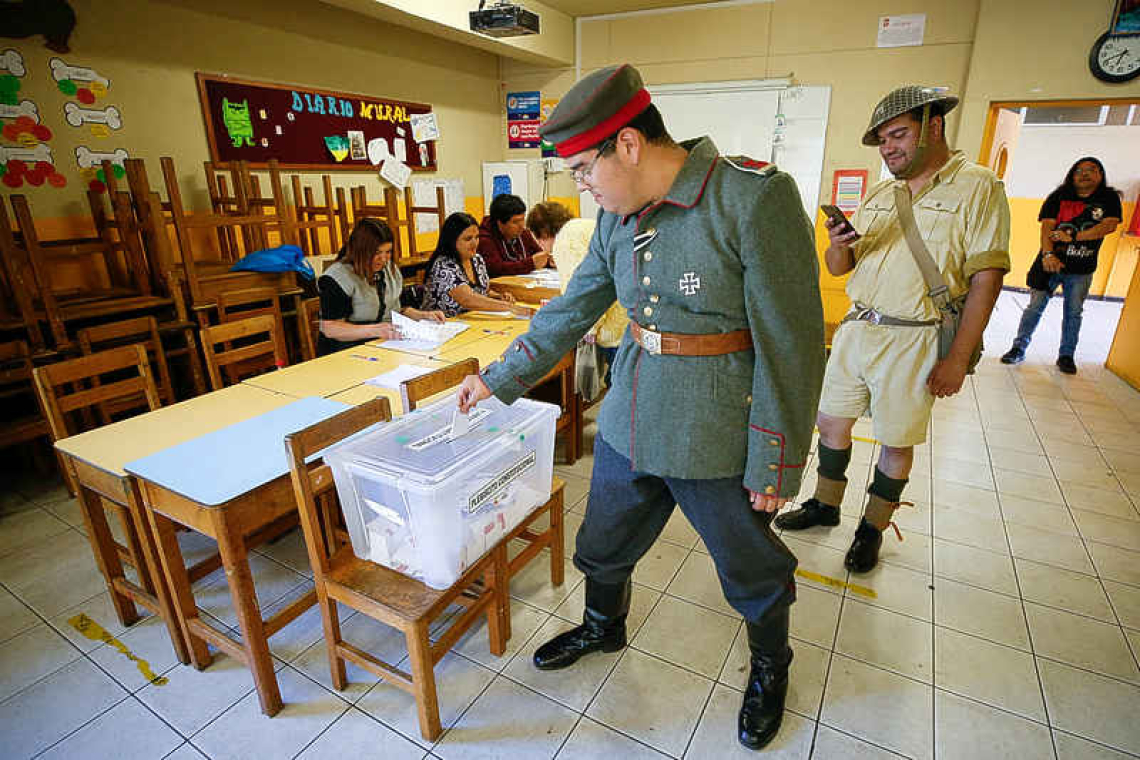Patricio Sanchez, wearing a World War II British infantry soldier costume, takes a picture of his brother Pablo Sanchez, wearing a World War I German infantry soldier costume, casting his ballot during a referendum on a new Chilean constitution in Valparaiso, Chile, on Sunday.
SANTIAGO/VALPARAISO, Chile--Chileans on Sunday rejected a new conservative constitution to replace its current text that dates back to the Augusto Pinochet dictatorship. With 90.16% of ballot boxes tallied, a total of 55.68% Chileans rejected the new text while 44.32% voted in favour of it. This is the second draft constitution in as many years that voters have rejected to replace its current text, a process born after large-scale, passionate and sometimes violent protests against inequality gripped the nation in 2019. "Finally after four years of intense debate and constitutional conversation, we've ended up at the same point," said political analyst Kenneth Bunker, adding that the end of the vote should bring more political stability and confidence for investors. Many Chileans have been voicing mistrust and disenchantment with the process after years of polarization and political infighting. Nina Vidal, 65, a secretary in the coastal city of Valparaiso said on Sunday that she was inspired by the first referendum but lost confidence in the second referendum. "I sincerely thought things were going to change" the first time, she said after casting her ballot. "But unfortunately nothing changes." The first assembly elected to draft a new text was dominated by leftwing forces, and the draft focused on social, indigenous, environmental and gender rights. But that text was overwhelmingly rejected by voters last September. The electorate swung right for the second draft and voters elected an assembly dominated by conservative parties. That text was considered more conservative and market-friendly than the 1980 constitution it could replace. It placed private property rights and strict rules around immigration and abortion at its center. Polls had suggested the new text was likely to fail but the race had tightened in recent weeks. The rejection of the conservative text can be seen as a win for leftist President Gabriel Boric. Boric said on Sunday that his government would continue to work on behalf of the people no matter the outcome. "Regardless of the results, our government will continue to focus clearly on the priorities of the people," Boric said. Boric said he wouldn't push for a third rewrite, but Bunker says the question is what the government will do next. "It's easier to change the constitution today and the question is how hard the government will push," Bunker said. "I don't think the conversation is going to stop," he added, noting that he expects the issue to become key in the next presidential elections. Some voters lamented the country's political polarization, which they said made it impossible for them to agree on a replacement constitution. "Our differences are so irreconcilable that we cannot find a middle ground from which to move forward, and that is very sad indeed," said architect Claudio Fernandez, 41, in capital Santiago.







